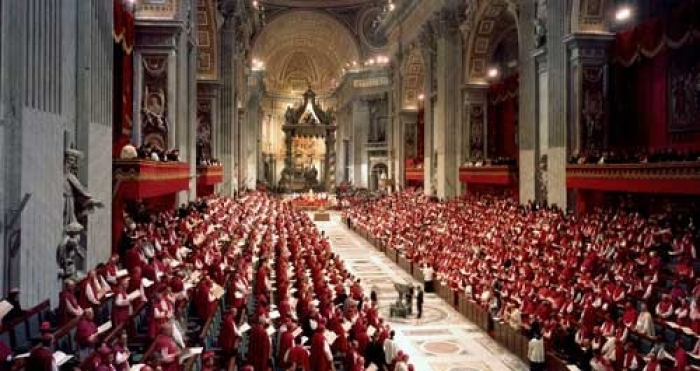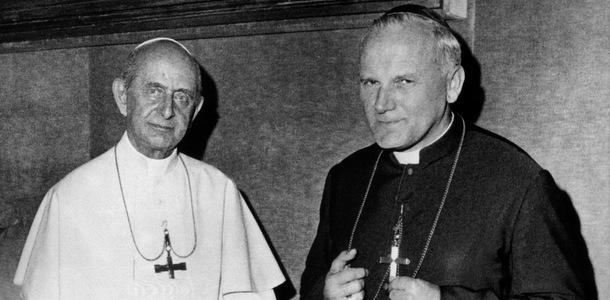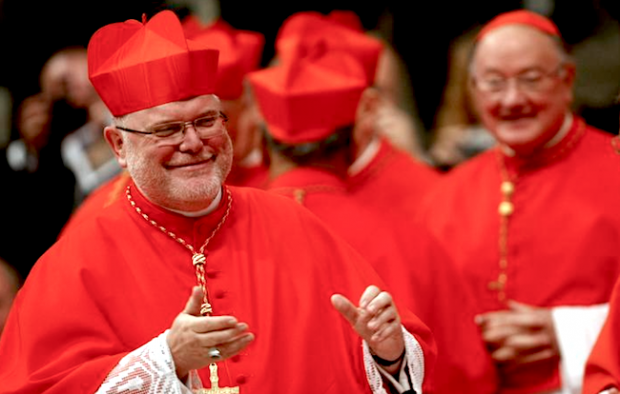However, absolutely none of this should come as a shock to Catholics. As the German bishops admit, their new guidelines are merely based on the 1983 Code of Canon Law promulgated by Pope John Paul II. Canon 844, section 4 of that Code states:
And where did the idea for this canon come from? Was it invented out of thin air by modernist theologians working on the 1983 Code? Hardly. Communion for non-Catholics was put into the 1983 Code because it had already been the legally allowed practice of the Conciliar Church since at least 1967.
Vatican II’s own 1964 Decree on Ecumenism, Unitatis Redintegratio, states the following regarding common worship between Catholics and non-Catholic Christians:
In addition, Vatican II itself, in its 1964 Decree on the Catholic Churches of the Eastern Rite, Orientatium Ecclesiarum, already allowed Eastern Schismatics to receive Holy Communion:

Pope Paul VI then wasted no time in clarifying what Vatican II “really meant” in regard to giving Protestants Holy Communion when in 1967 he approved a document entitled, “Directory for the Application of the Decisions of the Second Ecumenical Council of the Vatican Concerning Ecumenical Matters.” The directory states the following under the heading “Sharing in Liturgical Worship with Other Separated Brethren” in paragraph 55:
Paul VI explained the authoritative weight of his directory in a November 13, 1968 address to the members of the Secretariat for the Promotion of the Unity of Christians (SPUC):
Paragraph 55 of the directory was then “clarified” in a 1970 document from Paul VI’s SPUC entitled, “Declaration On The Position Of The Catholic Church On The Celebration Of The Eucharist In Common By Christians Of Different Confessions”, Dans Ces Derniers Temps.
Then, two years later, paragraph 55 had to be further “explained” in a 1972 document issued by Paul VI’s SPUC entitled, “On Admitting Other Christians To Eucharistic Communion In The Catholic Church”, In Quibus Rerum Circumstantiis. This document expanded the previous ambiguous authority granted Holy Communion to Protestants under the heading “Question VI: What Authority Decides Particular Cases: The Meaning Of No. 55 Of The Ecumenical Directory”:
No. 55 of the Directory allows fairly wide discretionary power to the episcopal authority in judging whether the necessary conditions are present for these exceptional cases. If cases of the same pattern recur often in a given region, episcopal conferences can give general directions. More often, however, it falls to the bishop of the diocese to make a decision. He alone will know all the circumstances of particular cases.
Apart from danger of death, the Directory mentions two examples, people in prison and those suffering persecution, but it then speaks of "other cases of such urgent necessity." Such cases are not confined to situations of suffering and danger. Christians may find themselves in grave spiritual necessity and with no chance of recourse to their own community. For example, in our time, which is one of large-scale movements of population, it can happen much more often than before that non-Catholic Christians are scattered in Catholic regions. They are often deprived of the help of their own communion and unable to get in touch with it except at great trouble and expense. If the conditions set out in the Directory are verified, they can be admitted to eucharistic communion, but it will be for the bishop to consider each case.
Then one year later in 1973, Paul VI’s SPUC issued another document attempting to “interpret” their own 1972 document! (You really can’t make this up.) The 1973 document was entitled, “Note Interpreting The "Instruction On Admitting Other Christians To Eucharistic Communion In The Catholic Church Under Certain Circumstances", Dopo Le Publicazione. This 1973 document stated:
Of note, all of these same rules and principles have been most recently reiterated in John Paul II’s 1993 “Directory for the Application of Principles and Norms on Ecumenism.”

Thus, we can see the recent decision of the German Bishops Conference to allow Protestant spouses to receive Holy Communion (in “certain cases” of course) is really just a natural development of Vatican II. For Vatican II allowed the concept in principle for Protestants and explicitly for Eastern schismatics. If a Neo-Catholic apologist tries to tell you that this is just another misinterpretation of the Council, we have Paul VI himself explaining to us through his approved directory in 1967 that this is precisely what Vatican II intended and that he was merely implementing the Council in allowing Communion for Protestants.
We also see, astonishingly, the expansion of the authority to give Communion to Protestants taking place even between 1967 and 1973. By 1973 the bishops already had carte blanche to determine under what situations Communion for Protestants was permissible as long as they bootstrapped it to some sort of “urgent necessity”. In addition, as long as these “exceptional cases” of Protestant Communion were common enough in an area, the episcopal conferences were even allowed to lay down guidelines for the practice as if it should be routine. This is exactly what Cardinal Marx and the German Bishops Conference are doing with Protestant spouses of Catholics.
Hopefully this little trip down memory lane will help Catholics realize that the latest shocking news out of Germany has actually been around, though much less publicized, since Vatican II itself. Thus proving yet again that the root of all of our current problems in the Church, despite what our Neo-Catholic friends may tell us, is, and always has been the Council.





